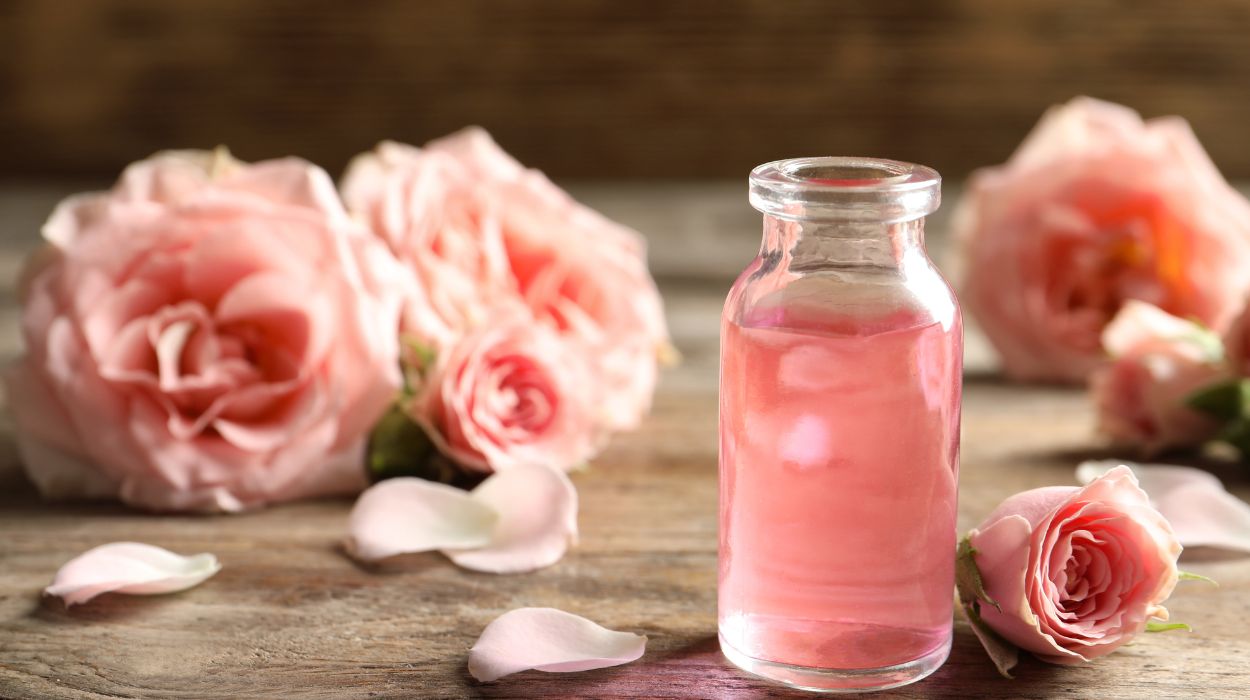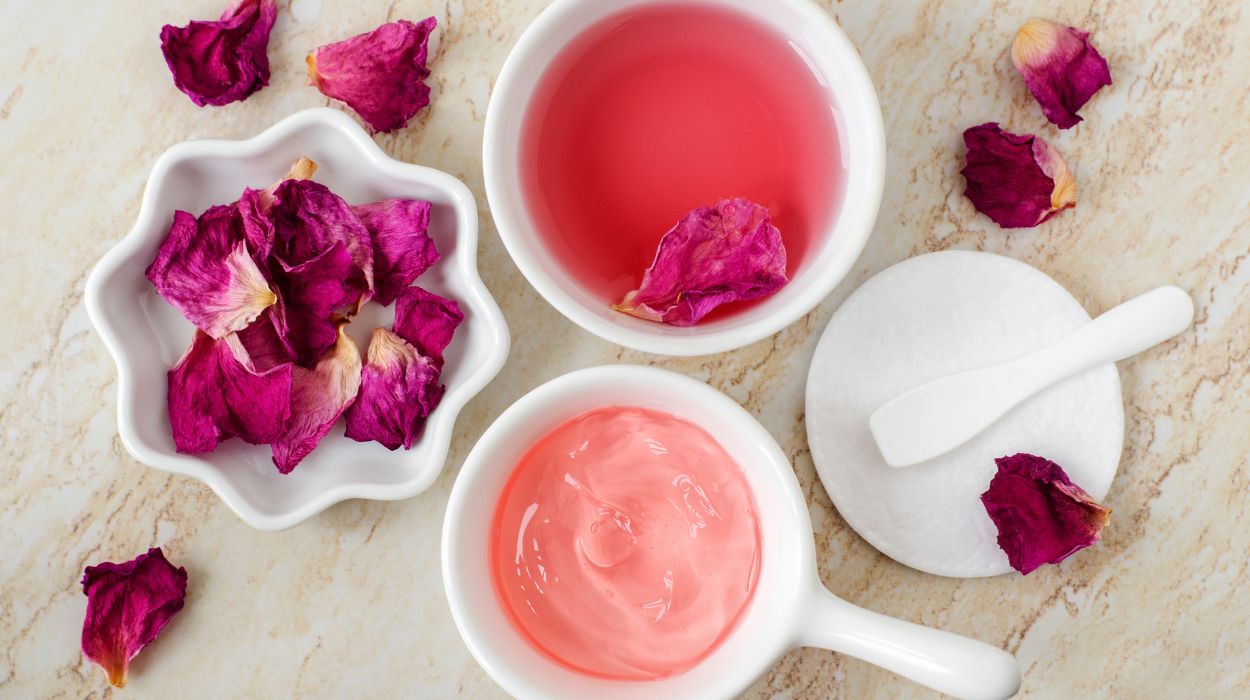 Expert's opinion
Expert's opinion
Expert's opinion
The article is a subjective view on this topic written by writers specializing in medical writing.
It may reflect on a personal journey surrounding struggles with an illness or medical condition, involve product comparisons, diet considerations, or other health-related opinions.
Although the view is entirely that of the writer, it is based on academic experiences and scientific research they have conducted; it is fact-checked by a team of degreed medical experts, and validated by sources attached to the article.
The numbers in parenthesis (1,2,3) will take you to clickable links to related scientific papers.
Rose Water For Hair: Benefits & Ways To Use For Hair Growth In 2024

Women worldwide swear by using rose water for hair growth, shine, and strength. But how accurate is this information? Is there scientific evidence to back it up and tangible evidence it works? And would a board-certified dermatologist suggest you add it to your natural hair routine?
Rose Water Benefits For Hair
Does rose water help hair growth? Rose water is good for hair because it has the following benefits:
- Anti-inflammatory properties.
- Potent antioxidant supply.
- May reduce oiliness and dandruff.
- May reduce frizz and add shine.
- Soothing, pleasant scent.
- Nourishing for the hair.
Rose Water For Hair: Benefits You Should Know

The origin of rose water use is traced back to ancient Persia, or today’s Iran, in the 10th century. Since then, it has been adopted by multiple civilizations for hair and skin.
Here are all the touted benefits of rose water with scientific evidence to back the claims:
Anti-Inflammatory Properties
Rose water is believed to have anti-inflammatory properties[1] due to flavonoids, tannins, and anthocyanins.
When rose petals are distilled to make rose water, some compounds are extracted and concentrated in the resulting liquid. When applied to the skin, rose water is thought to help reduce inflammation and redness, making it a popular ingredient in beauty products.
Rose water is also believed to have a cooling and soothing effect on the skin, which can also help to reduce inflammation and promote scalp and hair health. It is often used as a natural remedy for psoriasis,[2] eczema, and rosacea.
Potent Antioxidant Properties
Rose water has potent antioxidant properties[3] for hair due to the flavonoids and anthocyanins[4] present. These compounds have been shown to protect hair from oxidative stress, which can cause damage and breakage, contributing to hair loss.
May Reduce Oiliness And Dandruff
Rose water is a mild astringent. Astringents are substances that draw water out of tissues resulting in shrinking. For someone with an oily scalp, astringent hair products are beneficial in reducing oiliness and dandruff.
Astringents such as rose water prevent clogged pores and the appearance of oily skin by tightening the skin’s pores and decreasing oil production. This effect is supposed to be caused by rose water’s tannin[5] content, which has astringent qualities. This ingredient limits the build-up of excess oil within the hair strands.
It is also purported that rose water has antifungal qualities, which may aid in combating the yeast that can cause dandruff. The presence of phenolic chemicals[6] in rose water is also believed to have antifungal activity, which is likely to help reduce dandruff.
May Reduce Frizz And Add Shine
Two properties of rose water award it this benefit: pH balancing and moisturizing properties.
Rose water may facilitate pH balance on the scalp and hair, adding shine and smoothing the hair cuticle. Rose water’s pH value is 4.0-4.5, and a study concluded that using beauty products with a pH between 4.0-5.0[7] may be helpful.
An incorrect pH on the scalp can cause dandruff, itching, inflammation, excessive dryness, and irritation. The scalp’s natural pH is around 5.5; any significant deviation can disturb the skin’s barrier function and microbiome, causing problems. Therefore, maintaining the scalp’s optimal pH is crucial for a healthy scalp, and the natural plant’s essential oils in rose petals can aid in pH balancing.
Rose water can improve the hair’s texture and help minimize frizz by aiding the scalp and the individual hair strands to retain moisture and prevent dryness. This texturizing effect especially benefits someone with dry hair and a dry scalp.
Soothing Aromatic Scent
In the same way, you relish smelling fresh organic roses, rose water is similarly pleasant. Rose water has a soft aromatic scent due to the natural oils and compounds in the rose petals. When rose petals are distilled to make rose water, these oils and compounds are released into the liquid, giving it a fragrant, floral scent.
One of the essential compounds responsible for rose water’s scent is geraniol,[8] an alcohol found in many flowers. Geraniol is a sweet, floral scent often used in perfumes and other fragrances. Rose water also contains other natural compounds, such as citronellol,[9] nerol, and linalool, contributing to its unique scent.
Combining these compounds gives rose water its signature aromatic scent, often used in aromatherapy and making beauty products to promote relaxation[10] and reduce stress.
Hair Nourishing
Lastly, using rose water after your favorite shampoo is nourishing. It offers the scalp and hair:
- Vitamin A:[11] Essential for healthy hair growth, as it promotes cell growth and repair.
- Vitamin C:[12] A powerful antioxidant that protects the hair from oxidative stress, reducing heat damage and promoting overall health.
- Vitamin E: Another antioxidant that can nourish and protect the hair from environmental stressors, preventing dryness and breakage. It is among the best nutrients for hair loss treatment.
- Vitamin B3,[13] i.e., niacinamide: This vitamin has anti-inflammatory properties, promoting better circulation of a healthy scalp and preventing dandruff.
- Flavonoids and anthocyanins: These antioxidant compounds in rose water can help improve scalp circulation and protect the hair from damage.
How To Use Rose Water For Hair Growth?

You may apply rose water in the following ways to reduce oiliness, dryness, and frizz or eliminate any scalp ailment:
- Hair rinses: After shampooing, have a final rinse with rose water as a moisturizer and conditioning after-shampoo rinse. This application can help to reduce frizz and improve hair texture.
- Scalp treatment: Apply rose water to the scalp to soothe irritation and prevent dandruff. Rose water’s potential anti-inflammatory activity and antimicrobial properties can promote a healthy scalp.
- Hair mask: Mix rose water with other ingredients, such as honey or coconut oil, to create a nourishing hair mask. This mixture can help to strengthen and hydrate the hair, promoting healthy growth.
- Hair mist: Spray a mixture of rose water and aloe vera on your hair as a refreshing and hydrating hair mist. This mist can help to detangle and smooth the hair, reducing breakage and improving shine.
How To Make Rose Water?
Making homemade rose water for hair is relatively easy. It’s done by steeping rose petals under minimal heat in the following steps:
- Gather fresh roses.
- Rinse rose petals.
- Boil rose petals.
- Strain.
- Cool and store.
How To Use?
The best way to apply rose water to hair is to spray it evenly onto damp or dry scalp and hair. Gently massage it into the scalp and hair strands. You may add rose oil for deeper penetration.
Side Effects Of Rose Water On Hair
Rose water is generally safe for use on hair, but some individuals may experience allergic reactions or skin irritation. If you experience any redness, itching, or swelling after applying, rose water to your hair or scalp, discontinue use immediately and seek medical help.
It is also important to note that while rose water can provide many benefits for healthy hair and scalp, it may not be suitable for all hair types. If you have particularly oily or greasy hair, using rose water may exacerbate these issues, as it can add moisture to the hair.
Nonetheless, using pure, organic rose water without added ingredients like fragrances and preservatives is best.
Other Natural Hair Regrowth Treatments
Several natural hair regrowth treatments can help with hair loss, promote growth, and improve overall scalp and hair health. They are:
- Coconut oil[14] – moisturizes and strengthens the scalp and hair.
- Aloe vera – soothes the scalp and promotes hair growth.
- Onion juice – is rich in sulfur, which helps with hair regrowth.
- Castor oil – is rich in fatty acids that promote hair growth.
- Ginseng[15] – improves blood circulation to the scalp.
- Rosemary oil – stimulates hair growth.
- Peppermint oil – improves blood circulation to the scalp.
- Green tea – contains antioxidants that promote hair growth.
- White tea[16] – contains antioxidants and prevents heat and UV damage.
It is important to note that while these natural remedies may help promote hair growth and a healthy scalp, they may only work for some and may take time to see results. You should consult a registered dietitian or dermatologist before starting any new hair regrowth treatment.
Conclusion
Human hair prosperity solely relies on nutrition and self-care. And one way to get there is to take advantage of rose water for hair benefits. It provides nutrients, hydrates, balances pH, is antioxidant-rich, anti-inflammatory, aromatherapeutic, and possesses astringent properties.
So adding rose water to your natural hair routine is good for scalp health, hair growth, shine, and strength. And, you can make your rose water instead of buying variants filled with chemicals.
Even though the precise mechanisms underlying rose water’s properties are still not fully understood.
+ 16 sources
Health Canal avoids using tertiary references. We have strict sourcing guidelines and rely on peer-reviewed studies, academic researches from medical associations and institutions. To ensure the accuracy of articles in Health Canal, you can read more about the editorial process here
- Lee, M., Nam, T.G., Lee, I., Shin, E.J., Han, A., Lee, P., Lee, S.-Y. and Lim, T.-G. (2018). Skin anti-inflammatory activity of rose petal extract (Rosa gallica ) through reduction of MAPK signaling pathway. Food Science & Nutrition, [online] 6(8), pp.2560–2567. doi:https://doi.org/10.1002/fsn3.870.
- Mosca, M., Hong, J., Hadeler, E., Brownstone, N., Bhutani, T. and Liao, W. (2021). Scalp Psoriasis: A Literature Review of Effective Therapies and Updated Recommendations for Practical Management. Dermatology and Therapy, [online] 11(3), pp.769–797. doi:https://doi.org/10.1007/s13555-021-00521-z.
- Abidi, S., Zaidi Aamir, Iqbal, A. and Zafar Alam Mahmood (2019). Assessment of Rose Water and Evaluation of Antioxidant and Anti-inflammatory Properties of a Rose Water… [online] ResearchGate. Available at: https://www.researchgate.net/publication/331906604_Assessment_of_Rose_Water_and_Evaluation_of_Antioxidant_and_Anti-inflammatory_Properties_of_a_Rose_Water_Based_Cream_Formulation.
- Speer, H., D’Cunha, N.M., Alexopoulos, N.I., McKune, A.J. and Naumovski, N. (2020). Anthocyanins and Human Health—A Focus on Oxidative Stress, Inflammation and Disease. Antioxidants, [online] 9(5), p.366. doi:https://doi.org/10.3390/antiox9050366.
- Praveen Kumar Ashok and Upadhyaya, K. (2012). Tannins are Astringent. [online] ResearchGate. Available at: https://www.researchgate.net/publication/264783867_Tannins_are_Astringent.
- Simonetti, G., Brasili, E. and Pasqua, G. (2020). Antifungal Activity of Phenolic and Polyphenolic Compounds from Different Matrices of Vitis vinifera L. against Human Pathogens. Molecules, [online] 25(16), p.3748. doi:https://doi.org/10.3390/molecules25163748.
- Blaak, J. and Staib, P. (2018). The Relation of pH and Skin Cleansing. pH of the Skin: Issues and Challenges, [online] pp.132–142. doi:https://doi.org/10.1159/000489527.
- Mączka, W., Wińska, K. and Grabarczyk, M. (2020). One Hundred Faces of Geraniol. Molecules, [online] 25(14), p.3303. doi:https://doi.org/10.3390/molecules25143303.
- PubChem (2023). Citronellol. [online] @pubchem. Available at: https://pubchem.ncbi.nlm.nih.gov/compound/3_7-dimethyloct-6-en-1-ol.
- Duroux, R., Mandeau, A., Guiraudie-Capraz, G., Quesnel, Y. and Loing, E. (2020). A Rose Extract Protects the Skin against Stress Mediators: A Potential Role of Olfactory Receptors. Molecules, [online] 25(20), p.4743. doi:https://doi.org/10.3390/molecules25204743.
- VanBuren, C.A. and Everts, H.B. (2022). Vitamin A in Skin and Hair: An Update. Nutrients, [online] 14(14), p.2952. doi:https://doi.org/10.3390/nu14142952.
- Young Kwan Sung, Sun Young Hwang, So Young Cha and Kim, J. (2006). The hair growth promoting effect of ascorbic acid 2-phosphate, a long-acting Vitamin C derivative [3]. [online] ResearchGate. Available at: https://www.researchgate.net/publication/7364862_The_hair_growth_promoting_effect_of_ascorbic_acid_2-phosphate_a_long-acting_Vitamin_C_derivative_3.
- Choi, Y.-H., Shin, J.Y., Kim, J., Kang, N.-G. and Lee, S. (2021). Niacinamide Down-Regulates the Expression of DKK-1 and Protects Cells from Oxidative Stress in Cultured Human Dermal Papilla Cells. Clinical, Cosmetic and Investigational Dermatology, [online] Volume 14, pp.1519–1528. doi:https://doi.org/10.2147/ccid.s334145.
- Saxena, R., Mittal, P., Clavaud, C., Dhakan, D.B., Roy, N., Breton, L., Misra, N. and Sharma, V.K. (2021). Longitudinal study of the scalp microbiome suggests coconut oil to enrich healthy scalp commensals. Scientific Reports, [online] 11(1). doi:https://doi.org/10.1038/s41598-021-86454-1.
- Choi, B. (2018). Hair-Growth Potential of Ginseng and Its Major Metabolites: A Review on Its Molecular Mechanisms. International Journal of Molecular Sciences, [online] 19(9), p.2703. doi:https://doi.org/10.3390/ijms19092703.
- Koch, Zagórska, Marzec and Kukula-Koch (2019). Applications of Tea (Camellia sinensis) and its Active Constituents in Cosmetics. Molecules, [online] 24(23), p.4277. doi:https://doi.org/10.3390/molecules24234277.



